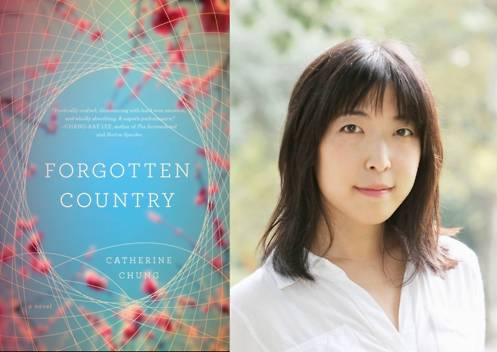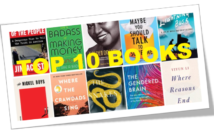April 1, 2012
Miriam Laufer
Book Critic
Books to Know Top 10 List
1. House of Stone: A Memoir of Home, Family, and a Lost Middle East
by Anthony Shadid, 2012
The late New York Times journalist Anthony Shadid chronicles his return to his ancestral home in Lebanon. Shadid formerly covered the Middle East for the Washington Post, for which he won two Pulitzer Prizes. As he works to restore the house his great-grandfather built, he recalls his family’s history and the present tensions in the Middle East.
2. Forgotten Country (See the book review)
by Catherine Chung
3. Bridge of Scarlet Leaves
by Kristina McMorris, 2012
In 1941, Maddie Kern elopes with her Japanese-American boyfriend Lane Moritomo, despite their families’ disapproval. One day later, the Japanese bomb Pearl Harbor and Maddie has made a sacrifice greater than she ever could have imagined. This compelling love story in the midst of one of the most regrettable actions of American history brings the Japanese internment camps into heartbreaking relief.
4. The Power of Habit: Why We Do What We Do in Life and Business
by Charles Duhigg, 2012
Habits are powerful patterns that control many aspects of individual and collective human behavior. New York Times reporter Charles Duhigg investigates habits from a scientific and personal perspective. His book offers explanations and inspiration to those who would like to break destructive habits or form positive ones.
5. Why Nations Fail: The Origins of Power, Prosperity, and Poverty
by Daren Acemoglu and James Robinson, 2012
Economists Daren Acemoglu and James Robinson posit that the success or failure of nations is rooted in their political structures and the subsequent effects on their economic infrastructures. Using examples from Mexico and the United States, to North Korea and South Korea, the authors show how differences in prosperity are ultimately best explained through differences in citizens’ ability to participate in politics. Their extensive, original research is refreshing and thought-provoking.
6. The Gods of Gotham
by Lyndsay Faye, 2012
The simultaneous formation of New York City’s first police department and wave of immigrants escaping the Irish potato famine in the late 19th century color this grim historical mystery. Timothy Wilde, a member of the new police force, will contend with his troublesome brother Valentine, and his own convictions to solve a string of gruesome child murders.
7. Please Look After Mom
by Kyung-Sook Shin, 2011
Winner of the Man Asian Literary Prize, South Korean author Kyung-Sook Shin’s novel has been translated into English. One day, a husband loses his wife in a train station and she does not return home. In the words of her husband, daughter, son, and finally, herself, emerges a picture of a woman who lives a nearly invisible life-until she disappears.
8. Starters
by Lissa Price, 2012
Another new release in dystopian literature, Starters follows sixteen-year-old Callie, who like other “Starters” or young people rents her body to older people, “Enders,” to make a living. However, she discovers a plot to do more than party in young bodies. Some Enders want to use her and other teens’ bodies to commit crimes. Readers will empathize with Callie’s moral decision-making and risky rebellion against her fate.
9. Turing’s Cathedral: The Origins of the Digital Universe
by George Dyson, 2012
Science historian George Dyson tackles the origins of the computer and the Internet in his latest book. He focuses on the group of scientists led by John von Neumann at the Institute for Advance Study at Princeton University. Though this was not the first or only contribution to the creation of the digital universe, Dyson is interested in Neumann and Alan Turing’s dream of a Universal Machine that uses theoretical mathematics to encode information. His history makes a number of interesting connections between mathematicians from different eras and explains in detail the theory behind the computer.
10. A Partial History of Lost Causes
by Jennifer Dubois, 2012
Set primarily in present-day Russia, Jennifer Dubois’ first novel revolves around the theme of inevitable loss. Thirty-year-old American professor Irina Ellison faces mental and physical degeneration in the form of Huntington’s disease, while Cold War era chess champion Alexander Bezetov challenges an ensconced Vladimir Putin for the Russian presidency. These two stories, narrated in first person, are brought together when Irina travels to Russia with a question for Bezetov: How do you play the game when you know you’re going to lose?





